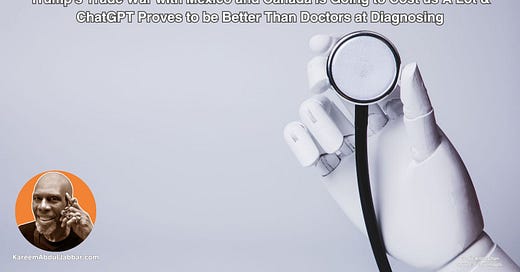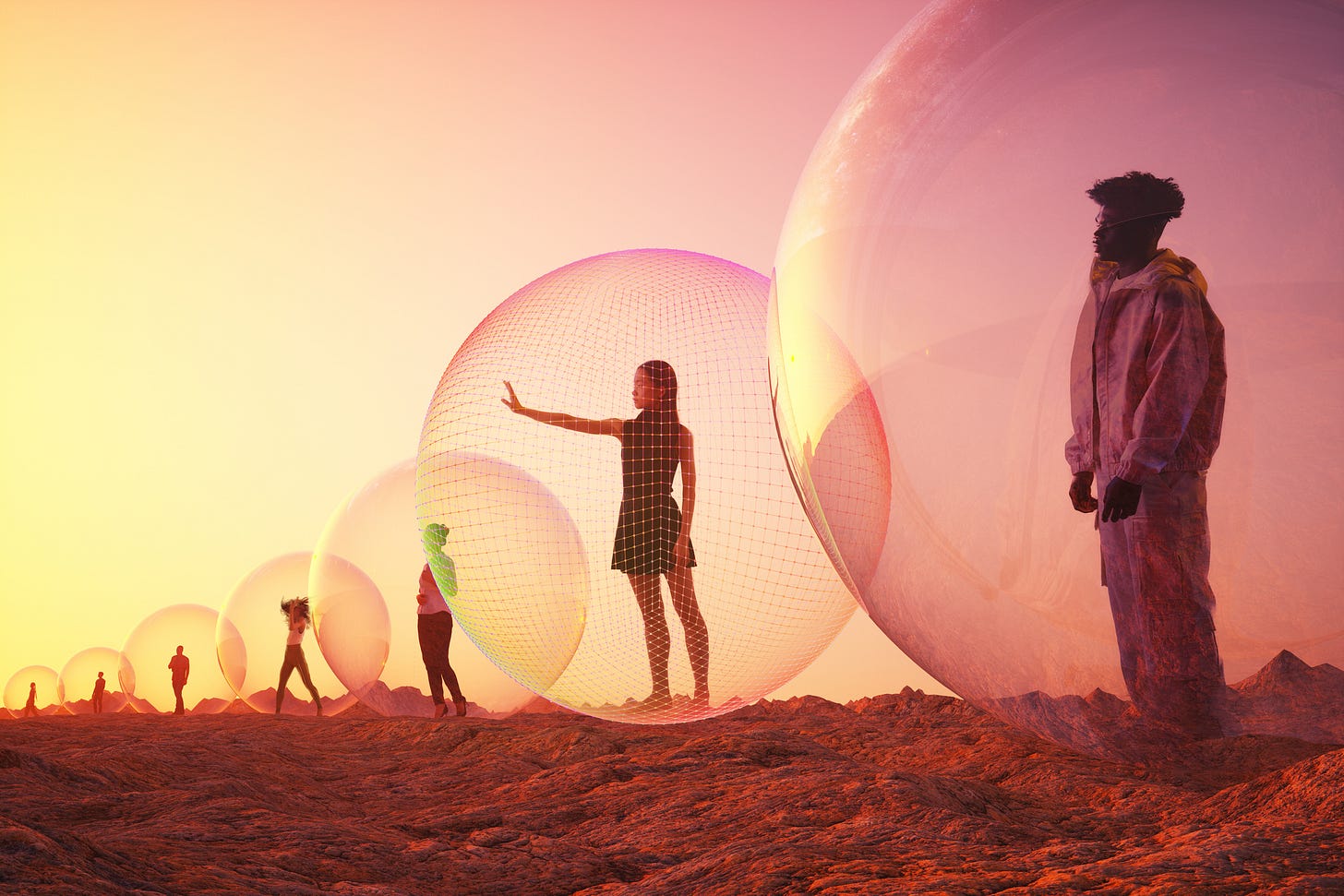Trump's Trade War with Mexico and Canada is Going to Cost us A Lot & ChatGPT Proves to be Better Than Doctors at Diagnosing
What I’m Discussing Today:
Kareem’s Daily Quote: I confess to believing in something without rational proof.
What could get more expensive if Trump launches a new trade war with Mexico and Canada: Trump supporters who hoped for cheaper goods just got a serious wake-up call.
Trump Names Kushner Family Patriarch as Ambassador to France: He’s a convict who Trump pardoned and Trump’s son-in-law’s father. You’re welcome, France. (He also named his daughter’s father-in-law to a prominent position.)
Smell like Trump: ‘victory cologne’ for sale as president-elect hawks his wares: Despite the responsibilities of preparing to run the country, Trump still has time to sell guitars and cologne. Renaissance man or street huckster?
Kareem’s Video Break: If only we all could be this honest with ourselves.
‘AI Jesus’ avatar tests man’s faith in machines and the divine: Actually, not a bad idea.
A.I. Chatbots Defeated Doctors at Diagnosing Illness: This is a game-changer in medicine.
Kareem’s Sports Moment: The triumph of age over arrogance.
What I’m Watching: TV & Movies: A Man on the Inside with Ted Danson is the most fun since Ted Lasso. A Real Pain and Get Millie Black are exceptional.
West Side Story “Something’s Coming”: This energetic song of youthful optimism still brings us hope, regardless of our age.
Kareem’s Daily Quote
We must believe in free will, we have no choice.
Isaac Bashevis Singer (1902-1991), a Polish-born Jewish-American writer.
Never heard of Isaac Bashevis Singer? Well, there’s a street named after him in Florida, a city square in Poland, and a street in Israel. Also, he won the Nobel Prize for Literature in 1978. One interesting thing about Singer was that he chose to write in Yiddish as a way to preserve the language.
I love the mischievous wit of his quote that appears to contradict itself. Which brings me to an embarrassing confession. I pride myself on my unwavering rational mind. I study logical fallacies. I reject opinions that lack verifiable proof from respectable sources. But when it comes to the concept of free will, I find myself faltering. At war with my own convictions.
[Quick definition: “Freedom” is the opportunity to make choices; “free will” is the ability to make choices without regard to physical or mental influences. If I’m tied to a chair, I lack freedom, but I still have free will. And while we acknowledge the powerful social and cultural influences on each person, free will means the ability to dismiss them through critical thinking to make a free choice.]
Rationally, there can be no such thing as free will. The theory of determinism says the universe is mechanical, a bunch of billiard balls crashing into each other and causing movement and change. Nothing can resist the impact nor change the trajectory caused by the impact. Even in our bodies, the brain is a machine with so many moving parts affecting it over which we have no conscious control that it seems ludicrous to assign free will to it. [No, the fact that you think you’re making a free will choice by doing something or not doing something else is not proof of anything.] The material universe operates on a sub-atomic level beyond our comprehension or will. That’s the science of it. I’ve read various scientific articles intent on proving free will with great hope—but they are unconvincing. I am a fan of Sartre and Existentialism—“condemned to be free” and all that—but it offers no objective evidence. The rational mind must accept this as fact.
And yet…
Despite the evidence and logic, I still allow myself to believe in free will. I acknowledge that this may be fantasy thinking, indulging in a belief that has no real evidence, but still, I find that I don’t want to live in a world without it. I need to believe that we are mostly responsible for our actions, that we have the power to resist past influences and change, and that we are alchemists who can transform hate into love, and indifference into compassion.
We’re all aware that if people didn’t believe in free will, it would be the greatest disruption in the history of humanity. All of our belief systems, governments, and social structures are built on the foundation that we have free will. If we didn’t believe it, there would be no justification for religion, punishment, reward, or assigning responsibility for any actions. If scientists announced they had definitive, irrefutable evidence there was no free will, we’d probably kill them.
We’d have no choice.
There are things that I may choose to believe without sufficient evidence because it makes my life better. Free will is one. The belief that people want to do good is another. If I’m wrong, I can live with that.





